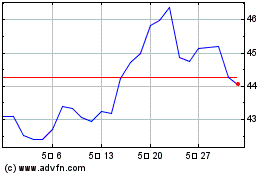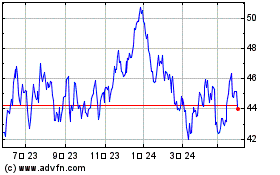BHP Annual Profit Drops by 58% on Commodity Price Pullback -- Update
22 8월 2023 - 9:03AM
Dow Jones News
By Rhiannon Hoyle
Mining giant BHP said its annual profit more than halved on a
year earlier, reflecting a pullback in commodity prices that has
squeezed profits across the industry as China's economy stumbles
and big markets like the U.S. grapple with sharply higher interest
rates.
BHP, the world's biggest miner by market value, reported a net
profit of $12.92 billion for the 12 months through June, down from
a profit of $30.90 billion a year earlier when it had benefited
from the sale of its oil-and-gas business and when commodity prices
were at or near record highs.
Analysts expected a profit of roughly $13.30 billion, according
to a Visible Alpha consensus compiled from 15 forecasts.
The miner cut its final dividend to 80 U.S. cents a share, less
than half the $1.75 paid a year ago.
Still, BHP said its full-year cash payout of $1.70 a share is
its third-largest ordinary dividend on record. Analysts had
forecast a total dividend around $1.72 a share, according to
Visible Alpha.
"BHP's external operating environment in FY23 was volatile," BHP
said. "Our key commodity prices were materially weaker leading to
lower revenue generation, while we also managed significant cost
inflation across the business."
BHP said its underlying profit, a closely watched measure that
strips out some one-time items, totaled $13.42 billion, down from
$23.82 billion a year ago.
Commodity prices fell on concerns about economic growth in
China, the largest buyer of many metals and minerals, and the
outlook for developed countries after sharp increases in interest
rates.
The miner was paid 12% less for its copper last fiscal year
versus the year-prior period, and 18% less for iron ore, the key
ingredient in steel.
The average price for its metallurgical coal, also used to make
steel, was down by 22% year-on-year, after surging in 2022 in big
part due to supply concerns after Russia's invasion of Ukraine
disrupted trade flows.
Its own production was mostly higher. BHP produced more copper,
iron ore, nickel and thermal coal than the year-earlier period. Its
output of steelmaking coal was flat year-on-year.
A drawn-out real estate crunch in China is especially worrying
for miners, given the importance of the sector to the country's
economy and metals demand. Another batch of disappointing economic
data for July, and a policy response that has so-far underwhelmed,
has prompted a number of global investment banks to lower forecasts
on China's full-year growth rate.
"The authorities have acknowledged that more policy support is
needed to fully embed the recovery," said BHP. "For FY 2024, the
key question is how effective this latest policy push will be."
The miner said demand in China has, however, held up relatively
well and that it expects both China and India to be sources of
stability for commodity demand in the near term.
By contrast, it took a more cautious tone on developed
economies, where demand for commodities has slowed substantially in
big part due to anti-inflation policies, it said. "We anticipate
that these competing forces may have a variable impact on commodity
prices in the period" ahead, said BHP.
Write to Rhiannon Hoyle at rhiannon.hoyle@wsj.com
(END) Dow Jones Newswires
August 21, 2023 19:48 ET (23:48 GMT)
Copyright (c) 2023 Dow Jones & Company, Inc.
BHP (ASX:BHP)
과거 데이터 주식 차트
부터 10월(10) 2024 으로 11월(11) 2024

BHP (ASX:BHP)
과거 데이터 주식 차트
부터 11월(11) 2023 으로 11월(11) 2024
